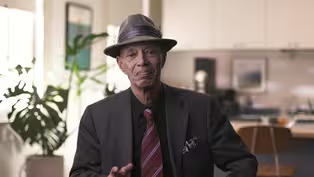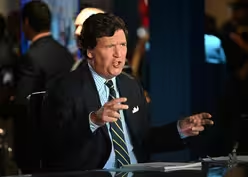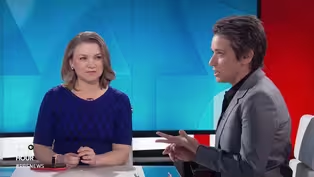
Nations evacuate citizens from Sudan as fighting intensifies
Clip: 4/24/2023 | 11m 29sVideo has Closed Captions
Nations scramble to evacuate their citizens from Sudan as fighting intensifies
The U.S. says it is facilitating the evacuation of civilians from Sudan where more than 400 people have died since fighting started 10 days ago. Drones and other military assets are flying over the route north to Egypt, but the U.S. does not have any military personnel on the ground since evacuating embassy staff to Djibouti over the weekend. Nick Schifrin discussed more with Sen. Chris Coons.
Problems playing video? | Closed Captioning Feedback
Problems playing video? | Closed Captioning Feedback
Major corporate funding for the PBS News Hour is provided by BDO, BNSF, Consumer Cellular, American Cruise Lines, and Raymond James. Funding for the PBS NewsHour Weekend is provided by...

Nations evacuate citizens from Sudan as fighting intensifies
Clip: 4/24/2023 | 11m 29sVideo has Closed Captions
The U.S. says it is facilitating the evacuation of civilians from Sudan where more than 400 people have died since fighting started 10 days ago. Drones and other military assets are flying over the route north to Egypt, but the U.S. does not have any military personnel on the ground since evacuating embassy staff to Djibouti over the weekend. Nick Schifrin discussed more with Sen. Chris Coons.
Problems playing video? | Closed Captioning Feedback
How to Watch PBS News Hour
PBS News Hour is available to stream on pbs.org and the free PBS App, available on iPhone, Apple TV, Android TV, Android smartphones, Amazon Fire TV, Amazon Fire Tablet, Roku, Samsung Smart TV, and Vizio.
Providing Support for PBS.org
Learn Moreabout PBS online sponsorshipGEOFF BENNETT: The U.S. announced a 72-hour cease-fire to start tonight in Sudan between the army and a rival paramilitary group.
Meantime, the U.S. also says it's facilitating the frantic evacuation of civilians from Sudan.
Drones and other military assets are flying over the land routes that lead from Sudan's capital, Khartoum.
The U.S. does not have any military personnel on the ground since evacuating embassy staff to Djibouti over the weekend.
Those civilians are fleeing street battles that have killed more than 400 people in fighting that started 10 days ago.
Nick Schifrin starts our coverage.
NICK SCHIFRIN: Sudan's capital is collapsing, open warfare in the streets, jets flying over civilian neighborhoods, and the airport and civilian airlines billowing smoke.
Khartoum is a city of five million.
Now it is marked by widespread destruction and depravity.
SELMA ADEL JAMAL, Khartoum Resident: Everybody is pretty much in lockdown and in their homes and just using what they have to sustain and get by.
NICK SCHIFRIN: We spoke with Selma Adel Jamal via Skype.
SELMA ADEL JAMAL: It is pretty dreadful.
There's a lot of people out of water, out of electricity, or it comes and goes.
But it's pretty bleak.
I mean, people are injured, and then people can't get their loved ones to the hospitals or to clinics.
NICK SCHIFRIN: She sent us this photo of a bullet that landed in her backyard.
SELMA ADEL JAMAL: Today was probably the most intense day for us, in regards to where we live and where the fighting took place.
It happened exactly over our rooftops.
I mean, my kids came running to me and said: "Mom, look, we have got warplanes there."
NICK SCHIFRIN: Her children and happier days, her 3-year-old, her 6-year-old son and her 8-year-old daughter doing their English homework together, introducing himself to cows.
SELMA ADEL JAMAL: I have a 6-year-old who drew a tank yesterday, and so things of like what he would see up in the sky, which is pretty sad.
I mean, you don't -- you don't want your kids to be living in such an environment.
The civilians are bearing the brunt of what these two individuals are doing right now, which I think is a power struggle just to be in power.
NICK SCHIFRIN: Those two individuals, military leader General Abdel Fattah al-Burhan, who was supposed to lead a transition to civilian rule, and Mohamed Hamdan Dagalo, known as Hemedti, the leader of the paramilitary Rapid Support Forces, former infamous Janjaweed militias that committed the genocide in Western Sudan's Darfur region.
More than two million people were killed.
They are fighting for the capital in the country, and likely won't stop until one wins.
Italy and other governments, but not the U.S., have managed to airlift hundreds of their citizens to safety.
But most Sudanese must try and board increasingly rare buses, whose drivers are gouging the desperate.
SELMA ADEL JAMAL: The fares was around less than $100 to, say, $50, and now it's reached up to $500.
We hope to, by tomorrow morning, take off and go to Egypt, praying that nothing will happen on the way there.
NICK SCHIFRIN: Her family will take an 18-hour bus ride north to Egypt.
Others drive northeast to Port Sudan on the Red Sea, where we spoke to Dallia Abdelmoniem after a 24 hour-bus ride and multiple military checkpoints.
DALLIA ABDELMONIEM, Sudanese Political Commentator: I think we spent something close like 48 hours calling, something no less than 50 different companies, trying to find the bus that will take us.
NICK SCHIFRIN: She's a former journalist turned baker and political commentator who accuses the U.S. and international community of accommodating Hemedti and his RSF forces to try and transition to civilian rule.
DALLIA ABDELMONIEM: The RSF is -- was made up of a group of gunmen, paramilitary mercenaries, who tortured and terrorized Darfur for so long.
And they're taking the message of torture and terrorism into the capital, and we, the people, are the ones caught in the middle.
Again, I mean, I have never been forced to leave my house.
I have never been forced to pack an emergency bag.
And just the idea that I may not come back for anytime soon is just -- it's just killing me, the fact that I'm leaving behind my home, family, friends.
This is my country.
We don't want to leave, but we have to.
SELMA ADEL JAMAL: We have dashed hope, but we do have aspirations and dreams to return to a democratic civilian rule in Sudan.
We want peace.
We want justice.
We want freedom for all.
That's pretty much it.
NICK SCHIFRIN: To discuss this conflict in Sudan and U.S. policy towards Sudan at this moment, we turn to Delaware Democrat Senator Chris Coons of the Senate Appropriations and Foreign Relations committees.
Senator Coons, thanks very much.
Welcome back to the "NewsHour."
First, on the cease-fire that was announced this afternoon by U.S. Secretary of State Antony Blinken, can this hold?
There, of course, have been multiple cease-fires that haven't held in the past.
SEN. CHRIS COONS (D-DE): Nick, I'm hopeful that this cease-fire will hold.
But we need to be skeptical and continue to apply both pressure and encouragement to the leaders of these two warring factions, to General Burhan, General Hemedti, and to continue to work with the U.N. and our other partners in the country to organize additional convoys that will allow more folks who want to leave the country to do so safely over land.
NICK SCHIFRIN: Staying on the politics for a minute, how can the U.S. help not only ensure that the cease-fire holds, but that it becomes a genuine resumption of political negotiations to transition back to civilian rule?
SEN. CHRIS COONS: Well, we have been engaging actively.
Both diplomatic and military leaders from the United States have put in a series of calls to both of these two warring faction leaders.
And we over the last few years, since the Sudanese civilian population rose up and bravely overthrew the long-term dictator Omar al-Bashir in 2019, we have engaged with and supported civil society groups in Sudan.
I think we need to continue to do so.
We have a significant Sudanese-American joint national population in Sudan and a diaspora community here in the United States.
Sudan, as you know, is a very large country, about the size of Alaska, a country of 45 million people, with lots of potential, lots of agricultural and mineral wealth, and we need to do everything we can to help avert the tragedy of it descending into a civil war or a proxy war.
NICK SCHIFRIN: The U.S., of course, isn't the only actor in Sudan.
Egypt backs the Sudanese military.
The UAE back Hemedti's paramilitary, as does the Russian paramilitary group the Wagner Group.
China has influenced, of course, because of economic investment.
As you have pointed out, is there not a problem of a lack of U.S. leverage in this moment?
SEN. CHRIS COONS: Well, we have relatively limited leverage, because, as I just referenced, for decades, this was a country that was on the state sponsor of terrorism list, while Omar al-Bashir was the dictator of Sudan.
I will remind you this was the country that harbored al-Qaida, that Osama bin Laden was in, and that helped facilitate their attacks on the USS Cole, a U.S.
Naval vessel, attacks on U.S. embassies in both Nairobi and Dar es Salaam.
Now, this was decades ago.
And our hope was, after the civilian overthrow of Bashir, that there would be a movement towards a democratically elected government.
In my last visit to Khartoum, I shared an Iftar dinner with then-Prime Minister Hamdok.
Unfortunately, since then, there's been a military coup and, as you have been reporting, just in the last few days, the resumption of violence of active fighting in Khartoum and across the country.
We do have some leverage, both the encouragement of the possibility of robust humanitarian and development assistance, and the possibility of targeted sanctions on those who might facilitate and foment further violence.
So, ongoing engagement by the United States, by other regional leaders, the African Union, Kenyan President Ruto, who's the leader of IGAD, a regional grouping, they can and should play a constructive and positive role.
NICK SCHIFRIN: Let's go back to the evacuation that you referenced.
There's some 16,000 Americans in Sudan.
That's an estimate.
But, today, Secretary -- sorry -- National Security Adviser Jake Sullivan pointed out, U.S. drones and other military assets are flying above Sudan.
U.S. warships are sailing off the coast.
The U.S. is helping Americans who reach the border to travel further.
But, as you can see, there are other countries, Italy, Spain, France, China, Saudi Arabia, among others, have all managed to figure out a way to go into Sudan and evacuate their citizens.
Why can't the U.S.?
SEN. CHRIS COONS: Well, none of them have evacuated anything like 16,000 people.
Let's be clear, this is not a country where it is easy or safe to go in, take control of the airport in Khartoum and fly military-scale missions to evacuate thousands of people.
Each of the countries you referenced have evacuated handfuls of people.
We have evacuated now, I think, something like 140 American citizens, both through the Special Forces operation to evacuate our embassy over the weekend and through the U.N.-led overland convoy that arrived in Port Sudan I think earlier today, if I'm not mistaken.
There will be other convoys.
We are working in close partnership with the U.N. and other countries to make available whatever means of evacuation are reasonably possible.
But there's a big difference between evacuating the Americans who work in our embassy and with USAID and providing for evacuation of thousands and thousands of people.
NICK SCHIFRIN: But... SEN. CHRIS COONS: It has never been our practice, Nick, to provide evacuation support for all citizens in a country.
NICK SCHIFRIN: Sorry to interrupt there, but do you fear the administration is too gun-shy when it comes to evacuations because of the chaos of the Kabul evacuation?
SEN. CHRIS COONS: Well, this is really apples and oranges, Nick.
In Kabul, we had thousands and thousands of U.S. and allied military troops on the ground.
We had decades of experience operating in Afghanistan, and we had an understandable moral obligation to help evacuate those who had fought alongside us in the 20 years that we were at war in Afghanistan.
The situation in Sudan is fundamentally different.
This is not a permissive environment.
The Khartoum Airport is not a military airport.
And for us to secure it and be able to operate safely regular flights out of it would take a significant insertion of American armed forces, something I certainly wouldn't recommend or support.
This is a lot closer to what happened in Ukraine or in Syria or in Yemen or in Libya, where, as those countries were invaded or descended into civil war,we evacuated U.S. citizens who served at our embassy and provided support for other Americans who sought to evacuate, but not through a big, large-scale, coordinated military operation.
NICK SCHIFRIN: Yes.
Yes, Senator Chris Coons Democrat of Delaware, thank you very much.
SEN. CHRIS COONS: Thank you, Nick.
Arkansas Lt. Gov. weighs in on abortion medication debate
Video has Closed Captions
Clip: 4/24/2023 | 6m 22s | Arkansas Lt. Gov. weighs in on debate over access to abortion medication (6m 22s)
A Brief But Spectacular take on restoring dignity
Video has Closed Captions
Clip: 4/24/2023 | 3m 6s | A Brief But Spectacular take on restoring dignity (3m 6s)
Carlson's departure and the future of Fox and the GOP
Video has Closed Captions
Clip: 4/24/2023 | 9m 8s | What Tucker Carlson's departure could mean for the future of Fox and the GOP (9m 8s)
Tamara Keith and Amy Walter on the abortion access debate
Video has Closed Captions
Clip: 4/24/2023 | 9m 12s | Tamara Keith and Amy Walter on the status of abortion politics and Biden's reelection bid (9m 12s)
The top library books people tried to ban last year
Video has Closed Captions
Clip: 4/24/2023 | 6m 47s | The top library books people tried to ban or censor last year (6m 47s)
Providing Support for PBS.org
Learn Moreabout PBS online sponsorship
- News and Public Affairs

FRONTLINE is investigative journalism that questions, explains and changes our world.

- News and Public Affairs

Amanpour and Company features conversations with leaders and decision makers.












Support for PBS provided by:
Major corporate funding for the PBS News Hour is provided by BDO, BNSF, Consumer Cellular, American Cruise Lines, and Raymond James. Funding for the PBS NewsHour Weekend is provided by...




